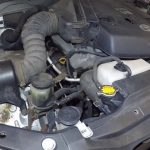The brake pads on your Accord have notches that let them slip back and forth from the rotor as the brake pedal is pressed. If something gets into the slides, this can result in the pads not fully disengaging from the rotor.
Shims or other junk often cause this problem. In such a case, it is almost certain that the pads will be worn incorrectly. While you’re replacing the shims and cleaning everything up, you should also replace the pads.
How Do You Fix Honda Accord Sticky Rear Brakes?
The braking system is the most critical among all the safety features of the Honda Accord. An improperly functioning system can cause you to be seriously injured or killed.
A caliper can get stuck in a number of different situations. Due to their mounting location behind the rotor rather than in front of it, like the front calipers, rear calipers get stuck more often than the fronts.

In addition to being protected from road debris, the calipers on the front wheels are covered by the rims. Dirt/grime is kicked up and into the caliper by the piston area since the rear calipers are mounted behind the rotors.
For good measure, the rear calipers should be serviced every six months. You should take it to a reputable repair shop if it is sticking and you cannot figure out why.
Brake Pads Are In Poor Condition
If you experience a sticky or spongy brake pedal, it’s likely that the pads are in poor condition and need to be replaced. The best way to determine if your brakes need to be serviced is by trying different techniques on the pad wear indicator (PI) wheel.

If an Emergency Brake Fluid bleed kit does not fix the issue, your brakes may require replacement.
You can also try lubricating the brake calipers with a light coat of oil before attempting service work; however, this should only be done as a last resort. Always consult with a professional mechanic when working on your car’s braking system.
Friction Surface Of Disk Behind The Pad Is Dirty
If the friction surface of your disk behind the pad is dirty, you can clean it with a vacuum cleaner and some degreaser. You can also use rubbing alcohol to lubricate the brake pads, then try applying pressure to stop the car again.

A thin metal sheet placed between the disk and rotor will help reduce wear on both components. Replacing or repairing your disks will fix this problem in most cases.
Parking Gear (If Applicable) Needs Adjustment
If your Honda Accord is having trouble braking after you’ve applied the brakes, it may be time for a gear adjustment. Verify that all of your parking gear is properly adjusted and working as it should before adjusting the brake system.
Checking these components can prevent further issues with your car’s braking system and save you from expensive repairs or replacements down the road.
Gear adjustments are typically easy to make on older cars but may be more difficult on newer models, depending on their design features.

Always consult a mechanic if you’re unsure about how to make an adjustment yourself – they will have greater knowledge and experience in this area than most homeowners do.
Mechanical Issue Causing Difficulties Stopping On Rough Surfaces
Honda Accord hydraulic brakes are notorious for having difficulty stopping on rougher surfaces, such as gravel or pebbles. If the brake pads have worn down and don’t grip the rotor anymore, you’ll notice that your car will struggle to stop quickly on these types of surfaces.
In most cases, this can be fixed by replacing either the parking brake cable or master cylinder assembly – but it’s important to get it done right so that you don’t end up with another mechanical issue down the line.
Many techniques are available to fix a stuck Honda Accord rear brake; consult an expert if necessary to find one that works best for you and your vehicle.
Regular maintenance is always key when keeping your car running smoothly – make sure to schedule a brake system checkup at least every six months.
What causes rear brakes to stick?
One common cause of rear brakes sticking is that the brake pads or rotors are damaged. Another issue can be brake fluid build-up in the caliper, preventing the pads from contacting the rotor properly and causing a stoppage.
A faulty brake may cause a rattling noise.
If there’s too much pressure on your brakes, either due to low air pressure or defective equipment, you may also experience issues with your caliper cylinders.
Finally, if debris has built up inside your brake system over time (a result of regular use), this might also lead to a sticky situation for your car’s wheel.
To Recap
If your Honda Accord is having trouble stopping quickly, it may be because of sticky brakes. There are a few ways to fix this problem, and the best approach depends on the severity of the issue.
If you only have minor brake issues, you can usually clean them up or replace worn parts. If your brakes are completely stuck or making a loud noise when you try to stop, however, you’ll need to take more drastic measures.





